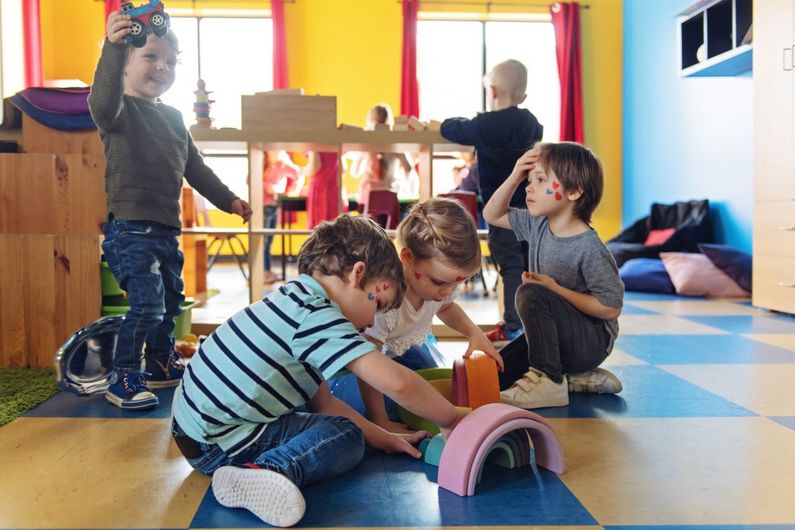Starting kindergarten on the right foot
- Salle de presse
11/02/2020
- UdeMNouvelles
Going into kindergarten already well-prepared gives a child advantagesgives a child many advantages later in life and lowers costs for society in the long term, researchers in Canada find.
Everything you ever really needed to know you learned back in kindergarten – that old saying gets some scientific support in a new study by researchers at Canada’s Université de Montréal and Université Sainte-Anne.
“We’ve known for years that getting off to a good start in kindergarten leads to better achievement over the long-term,” said lead author Caroline Fitzpatrick, an assistant professor of psychology at USA, in Nova Scotia.
“But now with our study we can really lock in the idea that early childhood skills help you achieve success and adopt a healthier lifestyle in emerging adulthood. And that’s promising for society as a whole.”
The study was published today in Pediatrics.
“Many children begin kindergarten inadequately prepared to benefit from classroom instruction,” said senior author Linda Pagani, a professor at UdeM’s School of Psycho-Education.
“Those who go in unprepared risk struggling throughout their academic journey. They arrive without the necessary tools in terms of cognitive skills, social skills and motor skills from physical activity”, added Pagani, who is also Senior researcher at CHU Sainte-Justine pediatric hospital in Montreal.
Math skills important
Fitzpatrick and Pagani examined associations between kindergarten readiness and academic, psychological and health risks that mainfested themselves when a child reached the end of high school.
“Kindergarten math skills contributed to better end-of high-school achievement and a lower dropout risk, and that was supported by observations from teachers, who also noted a reduced risk of substance abuse later on, said Fitzpatrick.
“Kindergarten classroom engagement also predicted involvement in physical activity and a 65-per-cent drop in the risk of a child being overweight by age 17,” added Pagani, who worked on the study with UdeM postdoctoral researcher Elroy Boers.
The authors came to their conclusions after examining Institut de la statistique du Québec data from a cohort of 2,000 children born in 1997 or 1998 who were part of the Quebec Longitudinal Study of Child Development .
At age 5, trained examiners assessed each child’s knowledge of numbers and their receptive vocabulary. Each spring, teachers reported kindergarten classroom engagement, such as how a child did tasks, followed directions and worked with others. At age 17, participants reported on their academic grades, their feelings of connectedness, whether they abused drugs or alcohol, their involvement in physical activity, and their height and weight. The drop-out risk was also estimated for each participant based on their grades retention and engagement at school.
Confounding factors discarded
The researchers then analyzed the data to identify any significant link between kindergarten readiness and academic, psychological and health risks by the end of high school. They attempted to discard possible confounding factors by adjusting their analyses for key indicators in the children (their sex, weight per gestational age, non-verbal IQ and internalizing and externalizing behaviors) and in their families (parental involvement, maternal depression, immigration status, family configuration and socioeconomic status).
“Early childhood readiness forecasts a later protective edge in emerging adulthood and suggests that youngsters who begin school with the right preparedness gain a lifestyle advantage,” said Fitzpatrick. “Our findings show a way to eliminate the established link between underachievement and disease by providing children with the conditions that will promote kindergarten readiness.”
Added Pagani: “Promoting kindergarten readiness seems, over the long-term, to help reduce the lifestyle risks generated by dropping out of high school. Therefore, policies to promote and preserve children’s early skills, such as providing stimulating childcare and diminishing family adversity, may thus represent a valuable policy strategy for governments to invest in.”
About this study
“Kindergarten readiness promises saving in later health and social costs,” by Caroline Fitzpatirck et al, was published November 2, 2020 in Pediatrics. Funding was provided through a Social Sciences and Humanities Research Council of Canada grant. Additional support was provided by the Fondation Lucie et André Chagnon, Institut de la Statistique du Québec, Ministère de l'Éducation et de l'Enseignement supérieur du Québec, Ministère de la Famille du Québec, Institut de recherche Robert-Sauvé en santé et en sécurité du travail, Centre hospitalier universitaire Sainte-Justine, and the Ministère de la Santé et des Services sociaux du Québec.
About Université Sainte-Anne
Université Sainte-Anne, the only francophone university in Nova Scotia, offers university and college programs as well as immersion and customized French second language training programs. Recognized for the excellence of its programs and its unique and exceptional living environment, it offers experiential learning opportunities that foster student engagement and success and a context that is conducive to the establishment of a culture of excellence in research and development. Firmly rooted in its community, it is a partner of choice to enhance the vitality of the regions surrounding its campuses and of Nova Scotia's Acadia as a whole.














